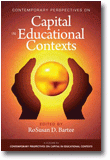
Contemporary Perspective on Capital in Educational Contexts
Edited by:
RoSusan D. Bartee, University of Central Florida
A volume in the series: Contemporary Perspectives on Capital in Educational Contexts. Editor(s): RoSusan D. Bartee, University of Central Florida.
Published 2010
The edited volume, Contemporary Perspectives on Capital in Educational Contexts, is timely in its unique and appropriate analyses of the prevailing internal and external dynamics of capital as indicative of the type of currency within institutional structures or the currency among individual stakeholders of education. The intersection of capital and currency emerges similarly and differently within the American compulsory-based system of K-12 and the choice-based system of higher education. More specifically, Contemporary Perspectives on Capital in Educational Contexts disentangles the broader challenges and opportunities of the institution of education and the individuals who comprise. Emerging insights from the analyses provide an informed basis for ascertaining the rules of engagement and means of negotiation for the respective constituencies. With that said, this volume essentially responds to three important questions: 1) What are the tenets of capital and currency in public schools and higher education?; 2 ) How do institutions and individuals navigate those tenets?; and 3) What general and specific implications do capital hold for the educational pipeline and beyond? These questions provide a useful framework for engaging critical conversations about the dynamics of capital while offering perspectives about how to improve the quality of currency in K-12 or colleges and universities. These questions further serve as a basis for eliciting more questions toward the consideration capital as both a conceptual construct and applicable model.
Contemporary Perspectives on Capital in Educational Contexts, too, is an expansion of the work of School matters: Why African American students need multiple forms of capital, where Bartee & Brown (2006) examines how the acquisition and possession of capital equips African American students in a highperforming, high-achieving magnet school in Chicago for competitiveness in school-generated and non-school generated activities. Success experienced by the students and the school become associated with the academic rigor and reputation while any shortcomings reflect an inadequate capacity of the school or the student to appropriately engage the other. School matters: Why African American students need multiple forms of capital (2006) further introduces an initial exploration of different forms of capital as producer (improve the status quo through inputs), consumer (participant based upon outputs), and regulator (maintain the status quo through the process) within the educational system. The multifaceted role of capital demonstrates its span of influence for institutional and individual capacities.
CONTENTS
Foreword: Making it on the Broken Pieces of Capital and Context, M. Christopher
Brown II. Insights into Different Forms of Capital, RoSusan D. Bartee
and M. Christopher Brown II. PART I: EDUCATIONAL CONTEXT AND THE CONSUMER
ASPECTS OF CAPITAL. Legal Information as a Source of Social Capital: The Need
for Broad and Sustained Engagement in School Policy Affairs, Mario S. Torres.
A Pedagogy of Self-Development: Making Room for Alternative Forms of Capital,
Carlos A. McCray and Floyd R. Beachum. Segmentation, Capital, and
Community College Transfer Students: Exploring Community Colleges as Agents of
Currency, Eboni Zamani-Gallagher, Stanley Bazile, and Tamara
N. Stevenson. PART I I: EDUCATIONAL CONTEXT AND THE PRODUCER ASPECTS OF
CAPITAL. Capital Gains and Losses: The Roles of Political, Social, and Cultural
Capital in School Reform and School Access, Sheneka N. Williams and Robert
W. Gaines. Mathematics Matters: Polices and Practices that Impact Access to
and Outcomes in the K–12 Pipeline, Lecretia A. Buckley. PART I I I:
EDUCATIONAL CONTEXT AND THE REGULATOR ASPECTS OF CAPITAL. Exploring Capital
Within College Choice: High Achieving, Low-Income African American Student Perceptions
of Selective Colleges, Phillis A. George. Bridging the Gap Between Theory
and Practice: An Intra-Educational Analysis of Capital and Its Diverse Forms for
Educational Opportunity and Attainment, Susan S. McClelland. Capitalizing
Through Learning: Forms of Capital that Affect Graduate School Admissions and
Achievement, Saran Donahoo. About the Contributors. About the Editor.
-
Paperback978-1-61735-363-5
Web price: $45.04 (Reg. 52.99)
-
Hardcover978-1-61735-364-2
Web price: $80.74 (Reg. 94.99)
- eBook9781617353659

-
 Contemporary Perspectives on Social Capital in Educational Contexts
Contemporary Perspectives on Social Capital in Educational Contexts
-
 Convictions of Conscience
How Voices From the Margins Inform Public Actions and Educational Leadership
Convictions of Conscience
How Voices From the Margins Inform Public Actions and Educational Leadership
-
 Diversity as Strategic Opportunity
Exploring New Paths to Good Administration
Diversity as Strategic Opportunity
Exploring New Paths to Good Administration
-
 Funding Public Schools in the United States, Indian Country, and US Territories
(Second Edition)
Funding Public Schools in the United States, Indian Country, and US Territories
(Second Edition)
-
 Recent Advancements in Education Finance and Policy
Recent Advancements in Education Finance and Policy
-
 The Early Years of Leadership
The Journey Begins
The Early Years of Leadership
The Journey Begins
-
 Who Controls the Preparation of Education Administrators?
Who Controls the Preparation of Education Administrators?

